Unit 4(单元复习课件)-七年级英语下册同步备课系列(人教版)
文档属性
| 名称 | Unit 4(单元复习课件)-七年级英语下册同步备课系列(人教版) | 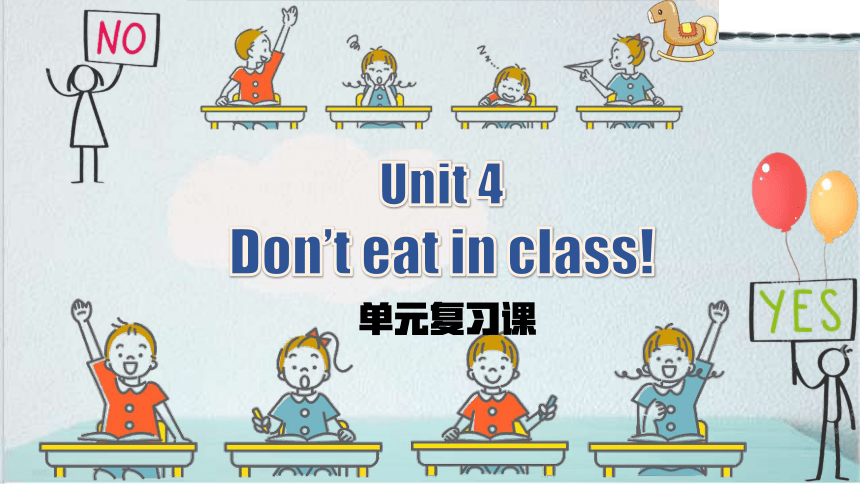 | |
| 格式 | pptx | ||
| 文件大小 | 37.4MB | ||
| 资源类型 | 试卷 | ||
| 版本资源 | 人教新目标(Go for it)版 | ||
| 科目 | 英语 | ||
| 更新时间 | 2024-03-14 09:37:43 | ||
图片预览

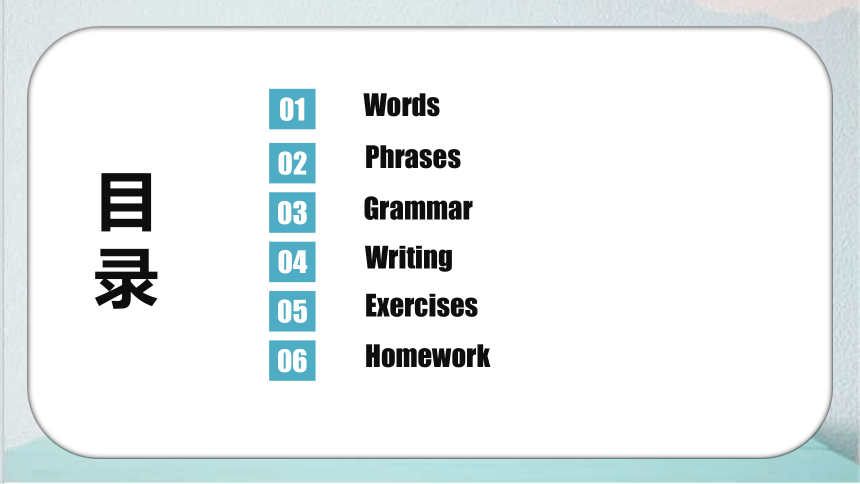
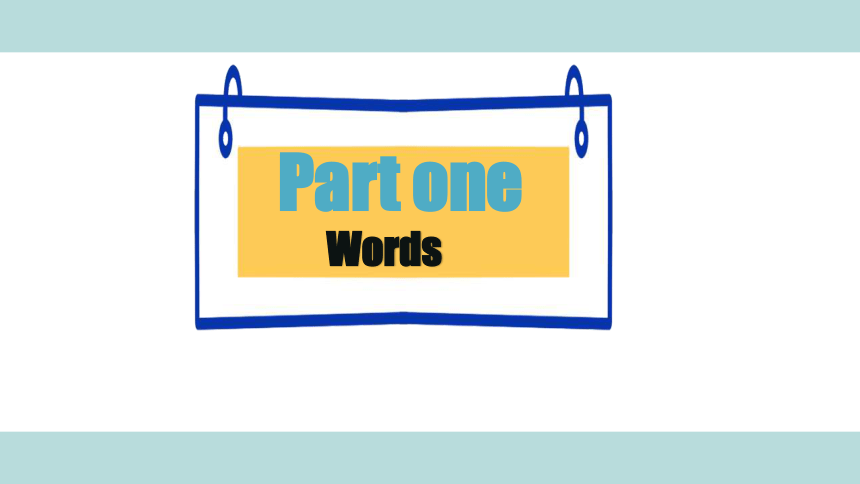

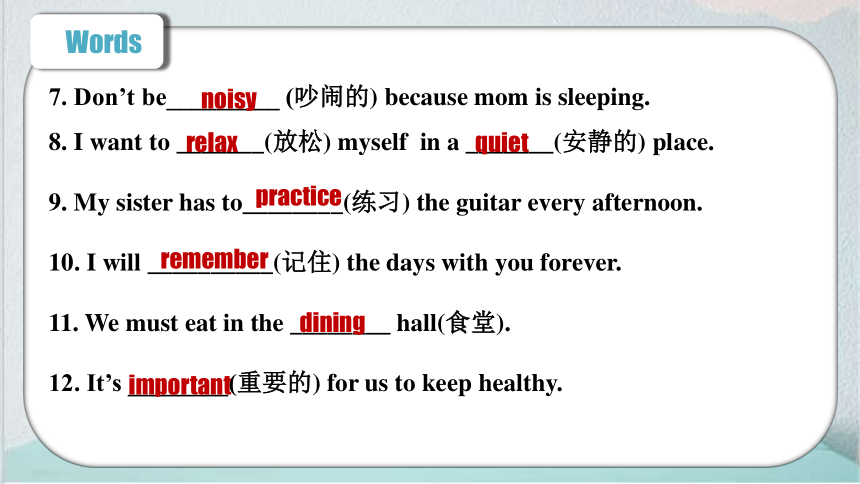
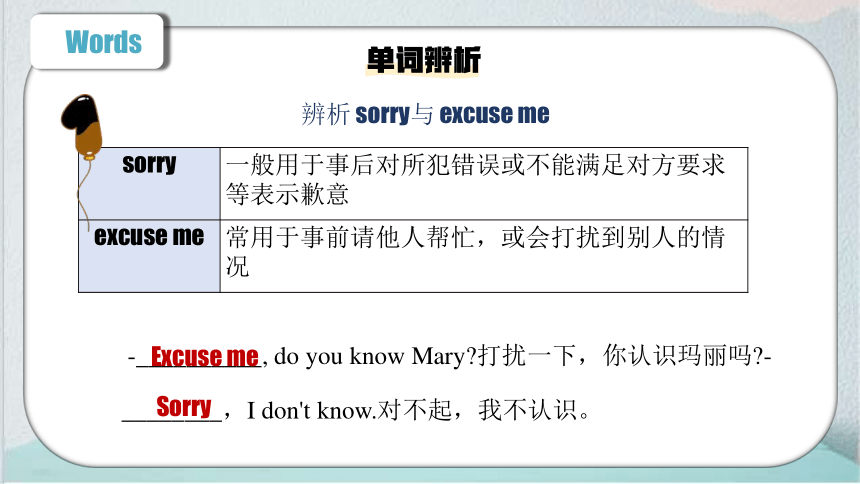

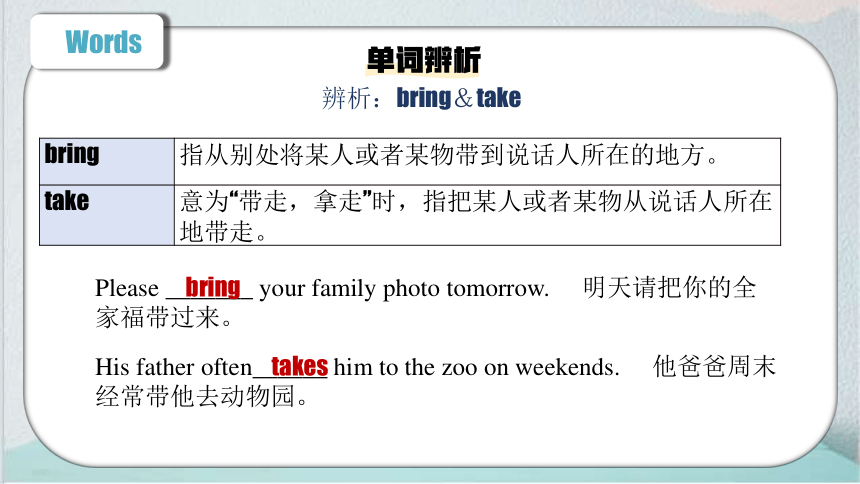

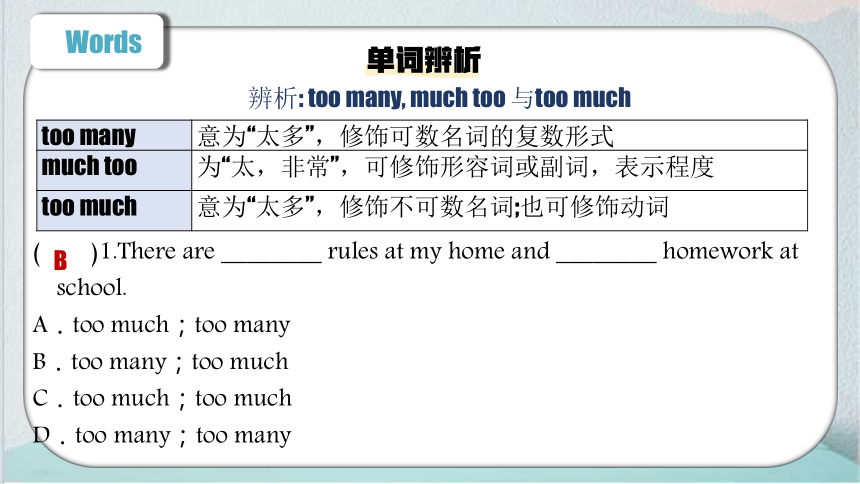

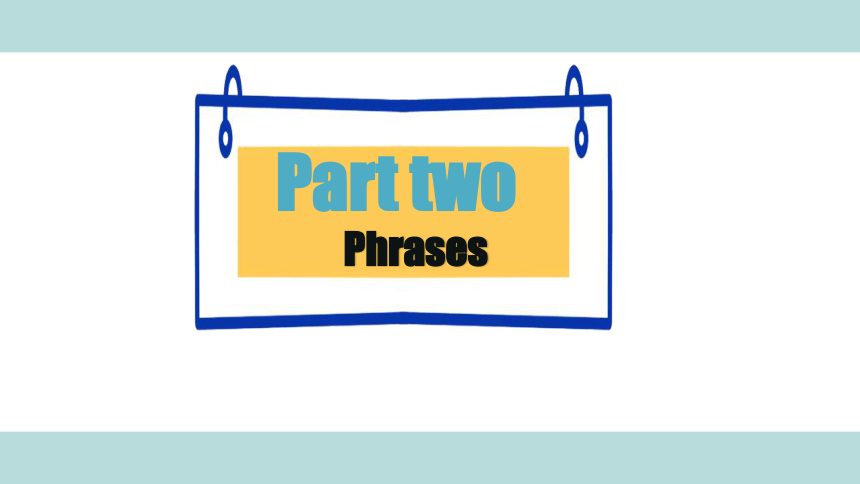
文档简介
目录
01
02
03
04
05
06
Words
Phrases
Grammar
Exercises
Writing
Homework
目录
01
02
03
04
05
06
Words
Phrases
Grammar
Exercises
Writing
Homework
1. Don’t_________(打架)with your classmates.
2. I like playing________(外面的) with my friends.
3. My parents are ______(严格的)with me. I can’t talk loudly(大声地) at home.
4. She washed her ________(头发) every day.
5. Do you have to wear school ________ (制服) at school?
6. _________(遵循) the rules here can _______(带来) you good _______(运气).
fight
outside
strict
hair
uniforms
Following
bring
luck
7. Don’t be_________ (吵闹的) because mom is sleeping.
8. I want to _______(放松) myself in a _______(安静的) place.
9. My sister has to________(练习) the guitar every afternoon.
10. I will __________(记住) the days with you forever.
11. We must eat in the ________ hall(食堂).
12. It’s ________(重要的) for us to keep healthy.
noisy
quiet
practice
dining
remember
relax
important
单词辨析
sorry
一般用于事后对所犯错误或不能满足对方要求等表示歉意
excuse me
常用于事前请他人帮忙,或会打扰到别人的情况
辨析 sorry与 excuse me
-__________, do you know Mary?打扰一下,你认识玛丽吗?-________,I don't know.对不起,我不认识。
Excuse me
Sorry
单词辨析
?辨析wear, put on, dress in
wear
动词,它的意思是“穿”,它表示状态。
put on
意思是“穿上、戴上”,它表示动作。
dress
作动词时,表示“为……穿衣”后接反身代词或人,也可以不接宾语。
in
in 表示穿着的状态,后接颜色或服装。
My father _______a T-shirt today. 我爸爸今天穿着T恤衫。
It’s cold outside, _____ your coatplease. 外面非常冷,请穿上你的大衣。
Can you ______ the baby for me? 你能帮我给孩子穿衣服吗?
The girl _______ red is my sister. 穿红衣服的女孩是我姐姐。
wears
put on
dress
in
辨析:bring&take
单词辨析
bring
指从别处将某人或者某物带到说话人所在的地方。
take
意为“带走,拿走”时,指把某人或者某物从说话人所在地带走。
Please _______ your family photo tomorrow. 明天请把你的全家福带过来。
His father often______ him to the zoo on weekends. 他爸爸周末经常带他去动物园。
bring
takes
remember to do sth.
“记得去做某事”,说明事情还没有做,其否定形式为 remember not to do sth.
remember doing sth.
“记得做过某事”,说明事情已经做过
辨析: remember to do sth.与 remember doing sth.
单词辨析
★This afternoon we're going to have an Englishclass; ________________(bring) your book.今天下午我们将要上英语课,记得带你的书来。
★I ________________(see) her somewhere.
我记得以前在哪儿见过她。
remember to bring
remember seeing
too many
意为“太多”,修饰可数名词的复数形式
much too
为“太,非常”,可修饰形容词或副词,表示程度
too much
意为“太多”,修饰不可数名词;也可修饰动词
辨析: too many, much too 与too much
单词辨析
( )1.There are ________ rules at my home and ________ homework at school.
A.too much;too many
B.too many;too much
C.too much;too much
D.too many;too many
B
( )2.Don't eat _____ meat any more.You are ____ fat now.
A.too much;much too
B.too many;many too
C.much too;too much
D.many too;too many
too many
意为“太多”,修饰可数名词的复数形式
much too
为“太,非常”,可修饰形容词或副词,表示程度
too much
意为“太多”,修饰不可数名词;也可修饰动词
辨析: too many, much too 与too much
单词辨析
A
1 课堂上
2 上学迟到
3 在走廊里
4 和…打架
带…去…
不得不做
穿一件校服
保持安静的
准时
在课上听音乐
in the hallways
fight with sb
have to do sth.
be/arrive late for school
bring…to…
wear a school uniform
be/keep quiet
(be) on time
listen to music in class
in class
__________________
__________________
__________________
__________________
__________________
__________________
__________________
__________________
__________________
__________________
1. 学晚上出外
2. 练习弹吉他
3. 洗碗
4. 帮助某人做某事
5. 做早餐
6. 每个早上
7. 铺床
8. 太多规则
9.. 太多食物
10. 许多东西
go out on school nights
practice (playing)the guitar
do /wash the dishes
help sb. (to) do sth.
make/cook breakfast
every morning
make the/ one’s bed
too many rules
too much food
lots of/a lot of/many things
__________________
__________________
__________________
__________________
__________________
__________________
__________________
__________________
__________________
__________________
1. 对某人严格的
2. 制定规则
3. 遵守规则
4. 吵闹的
5. 祝好运
6. 留短发
7. 过得愉快
8. 为某人取某物
9. 拜访朋友
10. 戴帽子/眼镜
be strict with sb.
make rules
follow the rules
be noisy
Good luck
keep/have one’s hair short
have fun/have a good time
get sth. for sb.
see/ visit friends
wear a hat / wear a pair of glasses
__________________
__________________
__________________
__________________
__________________
__________________
__________________
__________________
__________________
__________________
祈使句
概念
用于表达命令,请求,劝告,警告,禁止等的句子叫做祈使句,析使句最常用于表达命令,祈使句因对象(即主语)是第二人称,所以通常都省略主语。祈使句的动词都为一般现在时,句末则使用句号或感叹号来表示结束。
肯定结构;动词原型+其它成分否定结构:Don’t+肯定结构e.g. Eat in the classroom. Don’t eat in the classroom.
Do型
肯定结构:Let+宾语+动词原形+其它成分否定结构:Don’t+肯定结构Let+宾语+not+动词原形+其它成分e.g. Let him go. /Don’t let him go./Let him not go.
Let型
肯定结构:Be +表语+其它成分否定结构:Don’t+肯定结构e.g. Be a good student! Don’t be late for school!
Be型
(1) 表示主观的义务和必要,主要用于肯定句和疑问句,意思是“必须……,得……,要……”;由must引导的疑问句,肯定回答要用must或have/has to,否定回答要needn’t或don't/doesn't have to.意思是"不必”;
must 的否定形式 mustn't表示禁止,意思是“不能,不许”。-Must I finish my homework before six o'clock?6点之前我必须完成作业吗?-Yes, you must./No, you needn't./No, you don't have to.是的,你必须完成。/不,你没必要。You mustn't be late for school.你千万不要上学迟到。(2) 表示肯定的猜测,常用于肯定句中,意为”一定是,必然…”
You must be very tired. 你一定很累了。Mary must be in the library. 玛丽一定在图书馆里。
must 的用法
have to 的用法
表示客观需要做的事情,意思是“必须,不得不"。使用have lo时应注意的几点:
(1) have to后接动词原形,意为"必须做………;不得不做……”You have to wash my clothes first,你必须先洗我的衣服。
(2) have to有人称,数和时态的变化,其第三人称单数形式为has to.She has to help her mom make dinner,她不得不帮她妈妈做晚饭。
(3) 含有have to,has to的句子需分别借助助动词 do,does 构成疑问句或否定句。
Do they have to go home now?他们得现在回家吗?
You don’t have to go if you don't want to.如果你不想去,你就不必去。
have to 的句型结构
肯定句:
否定句:
一般
疑问句:
回答:
划线提问:
I have to do my homework.
I don't have to do my homework.
Do you have to do your homework?
Yes, I do. / No I don't.
What do you have to do?
主语+have/has to +其他
主语+don’t have to +其他
Do +主语+don’t have to +其他?
Yes, 主语+do.
No,主语+don't.
What do +主语+have to do?
1.我想加入音乐俱乐部。_______________________________
2.你会画画吗?是的,会。_____________________________
3.你想加入什么俱乐部?我想加入象棋俱乐部。_____________________________________________________
4.Lisa想加入什么俱乐部?她想加入英语俱乐部。
_____________________________________________________
5.你会干什么?_______________________________
I want to join the music club.
Can you draw? Yes, I can.
What club do you want to join? I want to join the chess club.
What club does Lisa want to join? She wants to join the English club.
What can you do?
6.你会跳舞吗?不,我不会。_____________________________
7.你非常擅长讲故事。_________________________________
8.你和Jim 能唱歌吗?_________________________________
9.你会拉小提琴吗?___________________________________
Can you dance? No, I can’t.
You are very good at telling stories.
Can Jim and you sing?
Can you play the violin?
写
作
要
求
1. 描述校规、家规或其他规章制度常用词汇:
rules, fight, quiet, sorry, follow, strict, noisy, keep, late, can't, must, have to, on time, listen to, do the dishes, make one's bed
2. 描述校规、家规或其他规章制度常用句型:
(1)There are too many rules in my family/our school. (2)I /We can't…
(3)I /We must… (4)I /We have to… (5) I think it's/they're…
话题分析
本单元话题为“制度(rules)”。要求用情态动词must, can和have to以及祈使句介绍学校或家庭中的规章制度。
素材积累
实
战
演
练
假如你是Peter, 你们家有许多家规, 对此你感到很不满意。请根据下面的提示给你的朋友Tom发一封电子邮件, 告诉他你的家规。
要求:不少于60词。
提示:1.早上6:00起床;
2.下午五点半前必须回家;
3. 上学日晚上不准看电视;
4.周末必须打扫房间。
5. ……(发挥两点)
Beginning
End
Boby
求助信
表达不开心/表达写信的目的等
家庭和学校的各种规则
询问你能帮助我吗?。。。
Every mornning, I have to/ must / can’t
In school, I have to/ must / can’t
After school, I have to/ must / can’t
家庭和学校的各种规则
First of all, I have to/ must / can’t
Second/ In addition, I have to/ must / can’t
Third/ Last but not least/Finally, I have to/ must / can’t
Expressions of boby
I must finish my homework first . Then I can watch TV.
I can only watch TV ______I finish my homework.
I must finish my homework ______ I can watch TV.
I can’t watch TV _____I don’t finish my homework.
I must finish my homework first _______I can watch TV.
before
after
if
so
1. I have to... and I must....
2. I have to... because I must....
3. I can only do ... before I finish....
4. I have to... after I finish....
Expressions of boby
5. I have to... so I can....
5. I have to... . Then I can....
Expressions of ending
1. I am not happy. What should I do?
2. I never have any fun in my life. I don’t know what to do.
范
文
展
示
Dear Tom,
Let me tell you about my family rules. I think there are too many rules in my family. First, I have to get up at 6: 00 in the morning. Second, after school I must go home before 5: 30 because I have to do my homework. Third, I can't watch TV on school nights. Finally, I have to clean my room on weekends. I must wash dishes after dinner. I have to go to bed before ten. I think they are very terrible. I don't like them.
Yours,
Peter
1. ____ wake up your sister, She needs a good sleep.
A. Dosen't B. Aren't C. Don't D. Can't
2.I have fun ______ basketball.
A. play B. playing C. plays D. to play
3.---_____we eat in the dining hall?
---Yes, we_____ A. Do, does B. Can, do
C. Do, can D. Can, can
4.There are _____ rules. A. too much
A. too much B. too many C. much too D. many too
5. You can’t eat _____ outside.
A. at B. \ C. in D. on
C
D
B
B
B
一、选择题
1.不要在教室里吃东西。
________ eat in _______________.
2.上课不要迟到。
Don’t ________ _______ for class.
4. 我们可以在教室里吃东西吗?
我们不可以在教室里吃,但可以在餐厅吃东西。
________ we ________in the classrooms
No,we ________ .
But we _______eat in the _______ _____.
5. 我们必须在操场上打篮球。
We ______ _____play basketball on the playground.
Don’t
the classrooms
be/arrive
late
Can
eat
can’t
can
dinning
hall
have to
二、完成句子
01
02
03
04
05
06
Words
Phrases
Grammar
Exercises
Writing
Homework
目录
01
02
03
04
05
06
Words
Phrases
Grammar
Exercises
Writing
Homework
1. Don’t_________(打架)with your classmates.
2. I like playing________(外面的) with my friends.
3. My parents are ______(严格的)with me. I can’t talk loudly(大声地) at home.
4. She washed her ________(头发) every day.
5. Do you have to wear school ________ (制服) at school?
6. _________(遵循) the rules here can _______(带来) you good _______(运气).
fight
outside
strict
hair
uniforms
Following
bring
luck
7. Don’t be_________ (吵闹的) because mom is sleeping.
8. I want to _______(放松) myself in a _______(安静的) place.
9. My sister has to________(练习) the guitar every afternoon.
10. I will __________(记住) the days with you forever.
11. We must eat in the ________ hall(食堂).
12. It’s ________(重要的) for us to keep healthy.
noisy
quiet
practice
dining
remember
relax
important
单词辨析
sorry
一般用于事后对所犯错误或不能满足对方要求等表示歉意
excuse me
常用于事前请他人帮忙,或会打扰到别人的情况
辨析 sorry与 excuse me
-__________, do you know Mary?打扰一下,你认识玛丽吗?-________,I don't know.对不起,我不认识。
Excuse me
Sorry
单词辨析
?辨析wear, put on, dress in
wear
动词,它的意思是“穿”,它表示状态。
put on
意思是“穿上、戴上”,它表示动作。
dress
作动词时,表示“为……穿衣”后接反身代词或人,也可以不接宾语。
in
in 表示穿着的状态,后接颜色或服装。
My father _______a T-shirt today. 我爸爸今天穿着T恤衫。
It’s cold outside, _____ your coatplease. 外面非常冷,请穿上你的大衣。
Can you ______ the baby for me? 你能帮我给孩子穿衣服吗?
The girl _______ red is my sister. 穿红衣服的女孩是我姐姐。
wears
put on
dress
in
辨析:bring&take
单词辨析
bring
指从别处将某人或者某物带到说话人所在的地方。
take
意为“带走,拿走”时,指把某人或者某物从说话人所在地带走。
Please _______ your family photo tomorrow. 明天请把你的全家福带过来。
His father often______ him to the zoo on weekends. 他爸爸周末经常带他去动物园。
bring
takes
remember to do sth.
“记得去做某事”,说明事情还没有做,其否定形式为 remember not to do sth.
remember doing sth.
“记得做过某事”,说明事情已经做过
辨析: remember to do sth.与 remember doing sth.
单词辨析
★This afternoon we're going to have an Englishclass; ________________(bring) your book.今天下午我们将要上英语课,记得带你的书来。
★I ________________(see) her somewhere.
我记得以前在哪儿见过她。
remember to bring
remember seeing
too many
意为“太多”,修饰可数名词的复数形式
much too
为“太,非常”,可修饰形容词或副词,表示程度
too much
意为“太多”,修饰不可数名词;也可修饰动词
辨析: too many, much too 与too much
单词辨析
( )1.There are ________ rules at my home and ________ homework at school.
A.too much;too many
B.too many;too much
C.too much;too much
D.too many;too many
B
( )2.Don't eat _____ meat any more.You are ____ fat now.
A.too much;much too
B.too many;many too
C.much too;too much
D.many too;too many
too many
意为“太多”,修饰可数名词的复数形式
much too
为“太,非常”,可修饰形容词或副词,表示程度
too much
意为“太多”,修饰不可数名词;也可修饰动词
辨析: too many, much too 与too much
单词辨析
A
1 课堂上
2 上学迟到
3 在走廊里
4 和…打架
带…去…
不得不做
穿一件校服
保持安静的
准时
在课上听音乐
in the hallways
fight with sb
have to do sth.
be/arrive late for school
bring…to…
wear a school uniform
be/keep quiet
(be) on time
listen to music in class
in class
__________________
__________________
__________________
__________________
__________________
__________________
__________________
__________________
__________________
__________________
1. 学晚上出外
2. 练习弹吉他
3. 洗碗
4. 帮助某人做某事
5. 做早餐
6. 每个早上
7. 铺床
8. 太多规则
9.. 太多食物
10. 许多东西
go out on school nights
practice (playing)the guitar
do /wash the dishes
help sb. (to) do sth.
make/cook breakfast
every morning
make the/ one’s bed
too many rules
too much food
lots of/a lot of/many things
__________________
__________________
__________________
__________________
__________________
__________________
__________________
__________________
__________________
__________________
1. 对某人严格的
2. 制定规则
3. 遵守规则
4. 吵闹的
5. 祝好运
6. 留短发
7. 过得愉快
8. 为某人取某物
9. 拜访朋友
10. 戴帽子/眼镜
be strict with sb.
make rules
follow the rules
be noisy
Good luck
keep/have one’s hair short
have fun/have a good time
get sth. for sb.
see/ visit friends
wear a hat / wear a pair of glasses
__________________
__________________
__________________
__________________
__________________
__________________
__________________
__________________
__________________
__________________
祈使句
概念
用于表达命令,请求,劝告,警告,禁止等的句子叫做祈使句,析使句最常用于表达命令,祈使句因对象(即主语)是第二人称,所以通常都省略主语。祈使句的动词都为一般现在时,句末则使用句号或感叹号来表示结束。
肯定结构;动词原型+其它成分否定结构:Don’t+肯定结构e.g. Eat in the classroom. Don’t eat in the classroom.
Do型
肯定结构:Let+宾语+动词原形+其它成分否定结构:Don’t+肯定结构Let+宾语+not+动词原形+其它成分e.g. Let him go. /Don’t let him go./Let him not go.
Let型
肯定结构:Be +表语+其它成分否定结构:Don’t+肯定结构e.g. Be a good student! Don’t be late for school!
Be型
(1) 表示主观的义务和必要,主要用于肯定句和疑问句,意思是“必须……,得……,要……”;由must引导的疑问句,肯定回答要用must或have/has to,否定回答要needn’t或don't/doesn't have to.意思是"不必”;
must 的否定形式 mustn't表示禁止,意思是“不能,不许”。-Must I finish my homework before six o'clock?6点之前我必须完成作业吗?-Yes, you must./No, you needn't./No, you don't have to.是的,你必须完成。/不,你没必要。You mustn't be late for school.你千万不要上学迟到。(2) 表示肯定的猜测,常用于肯定句中,意为”一定是,必然…”
You must be very tired. 你一定很累了。Mary must be in the library. 玛丽一定在图书馆里。
must 的用法
have to 的用法
表示客观需要做的事情,意思是“必须,不得不"。使用have lo时应注意的几点:
(1) have to后接动词原形,意为"必须做………;不得不做……”You have to wash my clothes first,你必须先洗我的衣服。
(2) have to有人称,数和时态的变化,其第三人称单数形式为has to.She has to help her mom make dinner,她不得不帮她妈妈做晚饭。
(3) 含有have to,has to的句子需分别借助助动词 do,does 构成疑问句或否定句。
Do they have to go home now?他们得现在回家吗?
You don’t have to go if you don't want to.如果你不想去,你就不必去。
have to 的句型结构
肯定句:
否定句:
一般
疑问句:
回答:
划线提问:
I have to do my homework.
I don't have to do my homework.
Do you have to do your homework?
Yes, I do. / No I don't.
What do you have to do?
主语+have/has to +其他
主语+don’t have to +其他
Do +主语+don’t have to +其他?
Yes, 主语+do.
No,主语+don't.
What do +主语+have to do?
1.我想加入音乐俱乐部。_______________________________
2.你会画画吗?是的,会。_____________________________
3.你想加入什么俱乐部?我想加入象棋俱乐部。_____________________________________________________
4.Lisa想加入什么俱乐部?她想加入英语俱乐部。
_____________________________________________________
5.你会干什么?_______________________________
I want to join the music club.
Can you draw? Yes, I can.
What club do you want to join? I want to join the chess club.
What club does Lisa want to join? She wants to join the English club.
What can you do?
6.你会跳舞吗?不,我不会。_____________________________
7.你非常擅长讲故事。_________________________________
8.你和Jim 能唱歌吗?_________________________________
9.你会拉小提琴吗?___________________________________
Can you dance? No, I can’t.
You are very good at telling stories.
Can Jim and you sing?
Can you play the violin?
写
作
要
求
1. 描述校规、家规或其他规章制度常用词汇:
rules, fight, quiet, sorry, follow, strict, noisy, keep, late, can't, must, have to, on time, listen to, do the dishes, make one's bed
2. 描述校规、家规或其他规章制度常用句型:
(1)There are too many rules in my family/our school. (2)I /We can't…
(3)I /We must… (4)I /We have to… (5) I think it's/they're…
话题分析
本单元话题为“制度(rules)”。要求用情态动词must, can和have to以及祈使句介绍学校或家庭中的规章制度。
素材积累
实
战
演
练
假如你是Peter, 你们家有许多家规, 对此你感到很不满意。请根据下面的提示给你的朋友Tom发一封电子邮件, 告诉他你的家规。
要求:不少于60词。
提示:1.早上6:00起床;
2.下午五点半前必须回家;
3. 上学日晚上不准看电视;
4.周末必须打扫房间。
5. ……(发挥两点)
Beginning
End
Boby
求助信
表达不开心/表达写信的目的等
家庭和学校的各种规则
询问你能帮助我吗?。。。
Every mornning, I have to/ must / can’t
In school, I have to/ must / can’t
After school, I have to/ must / can’t
家庭和学校的各种规则
First of all, I have to/ must / can’t
Second/ In addition, I have to/ must / can’t
Third/ Last but not least/Finally, I have to/ must / can’t
Expressions of boby
I must finish my homework first . Then I can watch TV.
I can only watch TV ______I finish my homework.
I must finish my homework ______ I can watch TV.
I can’t watch TV _____I don’t finish my homework.
I must finish my homework first _______I can watch TV.
before
after
if
so
1. I have to... and I must....
2. I have to... because I must....
3. I can only do ... before I finish....
4. I have to... after I finish....
Expressions of boby
5. I have to... so I can....
5. I have to... . Then I can....
Expressions of ending
1. I am not happy. What should I do?
2. I never have any fun in my life. I don’t know what to do.
范
文
展
示
Dear Tom,
Let me tell you about my family rules. I think there are too many rules in my family. First, I have to get up at 6: 00 in the morning. Second, after school I must go home before 5: 30 because I have to do my homework. Third, I can't watch TV on school nights. Finally, I have to clean my room on weekends. I must wash dishes after dinner. I have to go to bed before ten. I think they are very terrible. I don't like them.
Yours,
Peter
1. ____ wake up your sister, She needs a good sleep.
A. Dosen't B. Aren't C. Don't D. Can't
2.I have fun ______ basketball.
A. play B. playing C. plays D. to play
3.---_____we eat in the dining hall?
---Yes, we_____ A. Do, does B. Can, do
C. Do, can D. Can, can
4.There are _____ rules. A. too much
A. too much B. too many C. much too D. many too
5. You can’t eat _____ outside.
A. at B. \ C. in D. on
C
D
B
B
B
一、选择题
1.不要在教室里吃东西。
________ eat in _______________.
2.上课不要迟到。
Don’t ________ _______ for class.
4. 我们可以在教室里吃东西吗?
我们不可以在教室里吃,但可以在餐厅吃东西。
________ we ________in the classrooms
No,we ________ .
But we _______eat in the _______ _____.
5. 我们必须在操场上打篮球。
We ______ _____play basketball on the playground.
Don’t
the classrooms
be/arrive
late
Can
eat
can’t
can
dinning
hall
have to
二、完成句子
同课章节目录
- Unit 1 Can you play the guitar?
- Section A
- Section B
- Unit 2 What time do you go to school?
- Section A
- Section B
- Unit 3 How do you get to school?
- Section A
- Section B
- Unit 4 Don't eat in class.
- Section A
- Section B
- Unit 5 Why do you like pandas?
- Section A
- Section B
- Unit 6 I'm watching TV.
- Section A
- Section B
- Review of Units 1-6
- Unit 7 It's raining!
- Section A
- Section B
- Unit 8 Is there a post office near here?
- Section A
- Section B
- Unit 9 What does he look like?
- Section A
- Section B
- Unit 10 I'd like some noodles.
- Section A
- Section B
- Unit 11 How was your school trip?
- Section A
- Section B
- Unit 12 What did you do last weekend?
- Section A
- Section B
